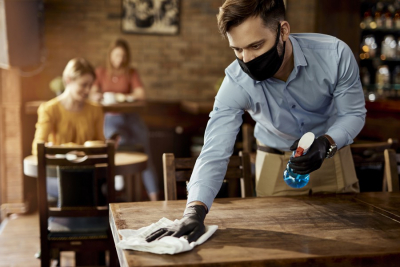A friend of mine had his night out at the cinema frustrated last week when, despite buying and paying for his ticket in advance, he arrived at the venue, one of a national chain, to find it closed. The manager happened to be leaving the site at the time he arrived and explained that they had been unable to keep to their opening schedule because they couldn’t get staff to agree to come into work.
In a similar vein, there have been numerous stories in the media recently regarding bars and restaurants being uncertain whether they’ll be able open or offer a full service owing to a shortage of waiting and serving staff.
A variety of reasons has been cited for these situations occurring and whilst we might be able to partially point a finger at poor management and planning, the common denominator may be previously unconsidered consequences of the furlough scheme.
When the Governments Return to Work Road Map was announced we posted about the steps that employers should be taking to ensure a smooth return to the workplace. The roadmap laid out a clear timeline that allowed for appropriate steps to be taken. Some of the steps we recommended include:
- Communicating your opening schedule in plenty of time to give staff fair warning
- Planning and sharing rotas and shifts as far in advance as possible
- Holding return to work interviews with team members
- Offering re-familiarisation days
- Communicating and training on your Covid-safe health and safety measures and protocols
If a return to work plan that didn’t include at least some of these points wasn’t implemented, then it may be of little surprise that some employees are reticent to simply let go of the cosy comfort blanket that the furlough scheme has provided over the last 12 months or so. It’s easy to see how being paid to not do very much could form a habit that’s hard to break.
However, if employers have work for their employees to do, then furlough is no longer an option and failure to attend work when requested should be treated as unauthorised absence. It’s not up to employees to decide to be on furlough and continuing to claim and pay furlough where there is work to be done is at best morally reprehensible and at worst, a fraudulent claim of Government grants; something that HMRC is unlikely to be forgiving towards.
The hospitality sector has suffered more than most throughout the coronavirus pandemic. Although we often expect a high staff turnover rate, particularly when work is seasonal, many workers have had to find new jobs outside the industry. With Covid creating an ever-present air of uncertainty, it’s little wonder that workers don’t want to return to the sector and give up the security of furlough that their new jobs will be able to offer should we have to suffer another lockdown.
Exacerbated by the effects of Brexit upon migrant workers, a shortage of staff creates its own problems. Bars and restaurants will be desperate to recoup the deficits of a “lost year” and will want to seize their share of the pent-up spending power of consumers. Risks include taking shortcuts with health and safety measures or allowing/encouraging staff to work beyond their permitted hours without breaks. This may be even more impactful as younger staff members are recruited to fill the void left by those who have moved on.
The Government also wants to see workers returning to offices to re-ignite the use of cafes and coffee shops, thereby bringing associated workers back to the workplace and off furlough. The lasting effects of this situation may be higher pay for employees in the hospitality sector as well as a higher regard for jobs within the industry.
Talk to us to discuss your return-to-work plan, including staff management and policy implementation. We’re available on 01452 331331 or by e-mail on This email address is being protected from spambots. You need JavaScript enabled to view it.



